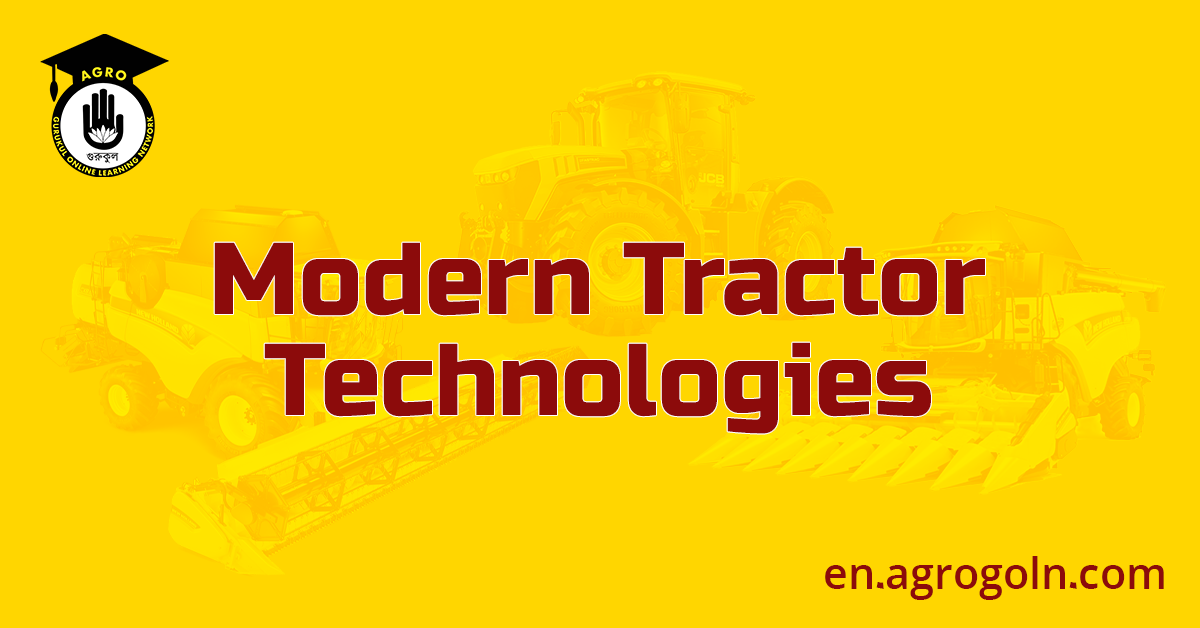Agriculture has come a long way since its humble beginnings, and modern farming practices are constantly evolving to meet the challenges of an ever-growing global population. At the heart of this agricultural revolution lies the modern tractor, a versatile and indispensable machine that has transformed farming practices worldwide. From traditional farming to precision agriculture, modern tractor technologies have revolutionized the way we cultivate, harvest, and sustainably manage our land.

The Evolution of Tractors
The history of tractors dates back to the late 19th century when steam-powered engines were first used in agriculture. However, it wasn’t until the early 20th century that internal combustion engines replaced steam engines, leading to the development of more efficient and compact tractors.
In the early years, tractors were relatively simple machines, primarily used for plowing fields and pulling heavy loads. Over time, engineering, materials, and technology advancements transformed tractors into highly sophisticated and intelligent machines.
Modern Tractor Technologies
Modern tractors are equipped with a wide array of cutting-edge technologies that optimize performance, efficiency, and environmental sustainability. Let’s explore some of the key modern tractor technologies:
- GPS Guidance and Auto-Steering: GPS technology has revolutionized precision agriculture by enabling tractors to follow precise paths with minimal overlap, reducing fuel consumption and optimizing field coverage. Auto-steering systems ensure straight and accurate rows, minimizing human error and maximizing productivity.
- Telematics and Connectivity: Tractors are now equipped with telematics systems that enable real-time monitoring of performance data, fuel consumption, maintenance schedules, and location. This connectivity allows farmers and manufacturers to optimize tractor usage and provide remote support and diagnostics.
- Variable Rate Technology (VRT): VRT enables tractors to apply inputs such as fertilizers, pesticides, and seeds at variable rates based on soil characteristics and yield potential. This targeted approach optimizes resource usage, reduces costs, and minimizes environmental impacts.
- Remote Sensing and Imaging: Drones and satellites equipped with sensors and cameras provide valuable data for monitoring crop health, identifying potential issues, and assessing field conditions. Tractors can utilize this data to implement site-specific farming practices.
- Electric and Autonomous Tractors: With the growing focus on sustainability, electric tractors are gaining traction, offering reduced emissions and lower operating costs. Autonomous tractors, guided by GPS and AI, have the potential to revolutionize farming by operating autonomously, improving efficiency, and reducing labor demands.
- Smart Implements and Attachments: Modern tractors can accommodate a range of smart implements and attachments, such as precision planters, GPS-guided sprayers, and harvesters. These implements optimize productivity and reduce waste by precisely targeting specific areas.
- Hydraulic and Powertrain Systems: Advanced hydraulic systems offer precise control over various tractor functions, including lifting, lowering, and steering. Improved powertrain systems enhance efficiency and power delivery, reducing fuel consumption and emissions.
- Driver Comfort and Safety: Ergonomic tractor designs prioritize driver comfort and safety. Climate-controlled cabins, suspension seats, and intuitive control systems ensure a pleasant and safe working environment.
Benefits of Modern Tractor Technologies
The adoption of modern tractor technologies has revolutionized agriculture, providing numerous benefits for farmers, the environment, and society as a whole:
- Increased Efficiency: Precision agriculture and smart farming practices optimize resource usage, reducing waste and improving overall efficiency. Tractors equipped with GPS guidance and auto-steering significantly reduce fuel consumption and labor costs.
- Enhanced Productivity: Advanced implements and attachments streamline farming processes, increasing productivity and reducing time and labor requirements. This enables farmers to cover more land in less time while maintaining high-quality yields.
- Environmental Sustainability: Technologies such as VRT and remote sensing enable farmers to apply inputs more judiciously, reducing the environmental impact of agricultural practices. Electric tractors further contribute to reduced emissions and a lower carbon footprint.
- Economic Benefits: The integration of modern tractor technologies often results in cost savings, improved yield, and better overall financial performance for farmers. Reduced fuel and input costs lead to increased profitability.
- Data-Driven Decision Making: Tractor telematics and connectivity provide farmers with valuable data insights, enabling informed decision-making and precise planning for future farming seasons.
- Labor Efficiency: The introduction of autonomous and electric tractors reduces the labor demands in agriculture, potentially attracting more people to farming and addressing labor shortages.
- Global Food Security: The increased efficiency and productivity achieved through modern tractor technologies contribute to global food security by producing more food with fewer resources.
Challenges and Future Prospects
While modern tractor technologies offer significant benefits, there are challenges to widespread adoption. The initial investment cost of advanced technologies can be prohibitive for some farmers, especially small-scale operators. Furthermore, the complexity of certain technologies requires training and skill development for farmers to make the most of these innovations.
Additionally, ensuring data privacy and security is critical when utilizing telematics and connectivity in tractors. Farmers must be assured that their data is protected and used responsibly.
Looking ahead, the future of modern tractor technologies holds exciting possibilities. Continued advancements in AI, robotics, and sensor technologies will likely lead to further improvements in autonomous tractors and smart implements. The integration of blockchain technology may enhance transparency and traceability in agricultural supply chains.
Moreover, as the global focus on sustainability intensifies, the adoption of electric and alternative-fuel tractors is expected to grow, reducing emissions and resource consumption in agriculture.
Conclusion
Modern tractor technologies have revolutionized agriculture, transforming traditional farming practices into a high-tech and data-driven industry. From precision agriculture to autonomous tractors, these technologies optimize efficiency, productivity, and environmental sustainability.
As farmers, manufacturers, and researchers continue to innovate, modern tractor technologies will play a crucial role in shaping the future of agriculture. By leveraging these cutting-edge advancements, we can work towards a more sustainable and food-secure world. The integration of modern tractor technologies with traditional farming wisdom will pave the way for a resilient and prosperous agricultural sector, ensuring that the agricultural revolution continues to flourish for generations to come.
